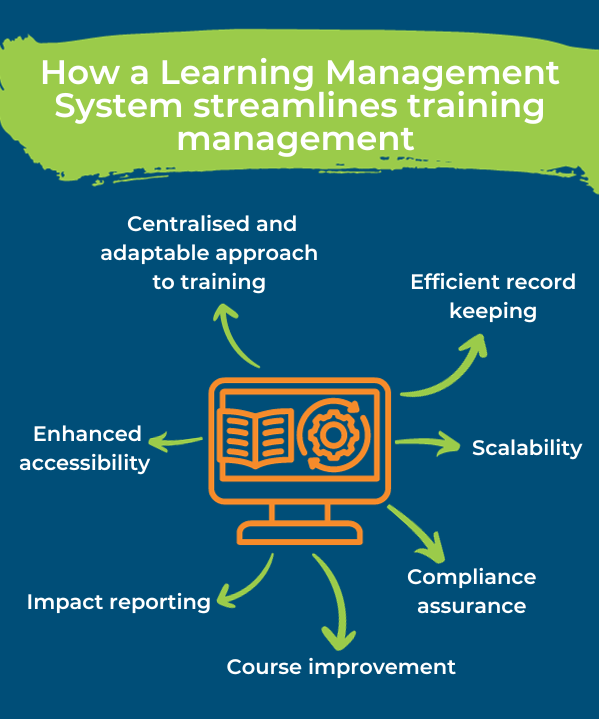Improving efficiency and compliance through a Learning Management System
Public sector organisations have long faced unique challenges when it comes to managing training courses and ensuring compliance. The need to stay up-to-date with ever-evolving regulations, complex staffing requirements, and demands of reporting isn’t easy. In the quest for efficiency, consistency, and improving outcomes, these organisations are increasingly turning to Learning Management Systems (LMS).
For many, the realisation that they need to manage training courses better often comes from several angles. One such perspective is the pressure that organisations such as safeguarding partnerships and education institutions are under to adhere to regulatory requirements and arrangements in their area, such as Working Together to Safeguard Children. Falling short of these legal obligations can trigger various forms of scrutiny and inspection, leading to severe penalties. This compels organisations to proactively seek solutions that align their training programs with these stringent standards.
 Likewise, as organisations grow or encounter shifts in the workforce, the need for scalable training solutions becomes increasingly evident. An LMS provides a centralised and adaptable approach to training, ensuring that employees can access training materials from anywhere, even in a remote work setup. This also broadens the reach of training courses, as exemplified by Sam Smith, Partnership Manager at Hampshire Safeguarding Children Partnership, who explained: “Hampshire is a huge county so when we introduced virtual learning and bite-sized webinars on a variety of subjects on our LMS, we found the uptake in courses dramatically increased as delegates didn’t need to travel. We’d never seen this level of buy-in prior to the pandemic. There is now a wider range of participants attending, such as police officers, childminders, military personnel and nurses.”
Likewise, as organisations grow or encounter shifts in the workforce, the need for scalable training solutions becomes increasingly evident. An LMS provides a centralised and adaptable approach to training, ensuring that employees can access training materials from anywhere, even in a remote work setup. This also broadens the reach of training courses, as exemplified by Sam Smith, Partnership Manager at Hampshire Safeguarding Children Partnership, who explained: “Hampshire is a huge county so when we introduced virtual learning and bite-sized webinars on a variety of subjects on our LMS, we found the uptake in courses dramatically increased as delegates didn’t need to travel. We’d never seen this level of buy-in prior to the pandemic. There is now a wider range of participants attending, such as police officers, childminders, military personnel and nurses.”
Needing to understand the impact of training programmes for accountability can drive the search to find a software solution. An LMS provides instant access to in-depth analytics and reports which assess the effectiveness of training initiatives. Organisations can quickly identify areas where employees may need additional support and further training. This is especially beneficial for geographically dispersed teams or multi-agency arrangements, as it allows organisations to ensure that employees are performing optimally and can help create a more productive and efficient workplace.
Additionally, insights help organisations identify areas where their courses may be less effective. By understanding what content is resonating with delegates and what is not, they can make improvements to their programme to ensure that they are providing the most valuable training possible.
Resource efficiency is a crucial factor as well. Inefficient training processes often result in significant financial and time costs, including manual administrative work, material distribution, and travel expenses for in-person courses. An LMS substantially reduces these costs, proving financially advantageous in the long run.
Record-keeping complexity is another challenge that the LMS tackles effectively. Maintaining accurate training records can be a time-consuming task. An LMS automates this, from data entry to email updates to delegates, and certificate distribution. This minimises manual effort, reducing the chances of errors and ensures that delegate training records are consistently maintained, as highlighted by Sarah Slater, Manager of the Policy, Improvements and Partnership at Merton Safeguarding Children Partnership: “The LMS allows us to streamline our training programme by placing the booking procedure and information distribution between Partners online.
“What previously took admin staff many hours of work booking attendees on events manually, they are now booked online by each participant. It enables practitioners to book training and keep track of their continued professional development. Once a person has created a log-in they are able to book training as well as cancel training, and they have a record of the training they have attended.”
With Phew’s LMS, public sector organisations can overcome their training management challenges, including ensuring compliance, improving efficiency, and gaining the ability to report the impact of training on outcomes.
The reporting dashboard makes it easy to evaluate learners’ knowledge and confidence pre-and post-training, along with the effectiveness of each course and completion rates.
Sarah O’Brien, Senior Learning & Organisational Development Officer at Derby and Derbyshire Safeguarding Children Partnership, commented: “The Phew Learning Management System has allowed us to build an authentic learning platform which delivers and tracks learning in one place, whilst allowing us to respond quickly to organisational changes and provide in-depth analysis to partners. It gives us the opportunity to create and support a culture of learning with increased flexibility to meet the needs of our stakeholders, regardless of location.”
If you’re curious about how the Phew LMS can enhance your organisation’s safeguarding training events and courses, reach out to our friendly team at hello@phew.org.uk. Additionally, learn how Derby and Derbyshire Safeguarding Children Partnership achieved a 630% increase in delegate bookings and a 360% rise in course offerings using Phew’s Learning Management System by downloading their case study.
